The Problem With Fake Buskers
September 27, 2022
When strolling through Old Town Pasadena, Old Town Monrovia, or even just every day on the street, it’s not uncommon to spot a busker or two. Buskers are people who sing or play an instrument for money donations. Whether it’s for fun, to make money, or simply to get their names out, buskers often provide entertainment and music for the people around them.
However, within the last few years, there has been an increase in buskers faking their performances. Most commonly seen in instrumentalists, particularly violinists, the people will fake creating music and instead have a backing track playing a recording of it. As a result, unwitting passersby will donate money, not knowing that they are funding a scam. Most of these scammers have also been known to have signs falsely proclaiming to need money to pay bills or help a sick relative in order to try to rake in more donations.
For instance, many false busker violinists buy an electric violin, which only runs about $50-100 USD, this contrasts with real violins that can cost thousands. In using an electric violin this enables the player to have a speaker setup, which is really just playing a pre-recorded track usually stolen from another musician instead of being connected to the instrument. They then either play without facing the audience or mime playing, moving their bow along to the music and “finger-syncing” (similar to lip-syncing in singing) without any actual sound coming out of their instrument.
In a video of a person confronting a false violinist, the videographer angrily states that “This [fake busking] is not cool. You’re taking people’s money and you’re not even playing.”
Although it’s not illegal, fake busking is still essentially a method of stealing money from onlookers. Many say it’s disrespectful towards people who genuinely need money or publicity and to those who have spent lots of time, energy, money on learning their art. This also shows more people that all they need is a Bluetooth speaker and a cheap instrument to get away with a hustle.
Arcadia High School (AHS) Freshman violinist Srimanvita Kamisetti said “Playing any instrument is difficult and an art you need to work for,” adding “those people who fake it are being extremely disrespectful to everyone who does music.”
Unfortunately, cautioning people to not fall prey to these scams is often inadvertently harmful to real buskers. Pedestrians may be unsure whether buskers are real or not and simply not give any money to people playing music, regardless if they’re playing it or not. This takes donations away from the people who have a passion for music and put effort into creating it, just because a certain few sparked suspicion.
“Busking has been a longstanding way for musicians to earn money or to make an honest living for centuries,” said David Wallace, the chair of Berklee College of Music’s strings department, in an interview with NPR. “But when people become skeptical about whether a musician is legitimate, they become more cautious about giving to any musician.
Fortunately, some real musicians are already taking action to stop fake buskers. There are several videos of real musicians calling out fake buskers and reporting them. You don’t have to be a musician in order to spot a scammer. By simply watching for clues, such as seeing if the music lines up with what the person appears to be playing you can also put a stop to the faking busking. If a musician appears to be faking their music, make sure not to donate to them. Although fake buskers need to be stopped, we shouldn’t let these scams ruin our appreciation for all the real musicians out there.
Photo Courtesy of UNSPLASH.COM

